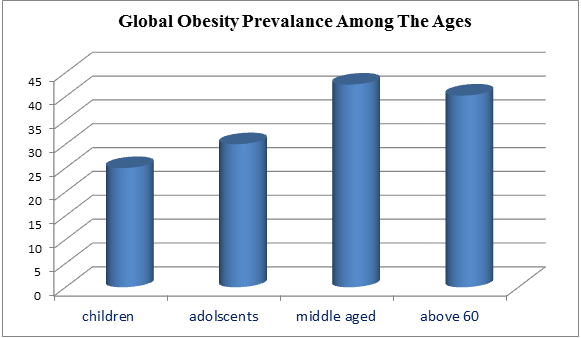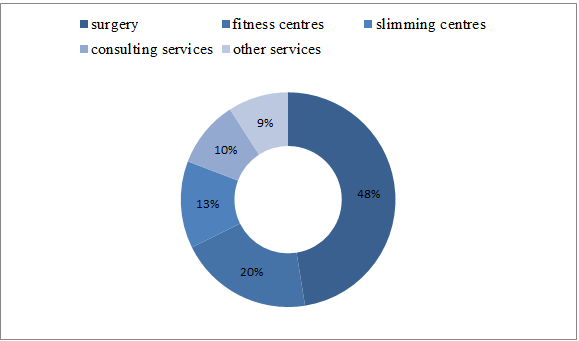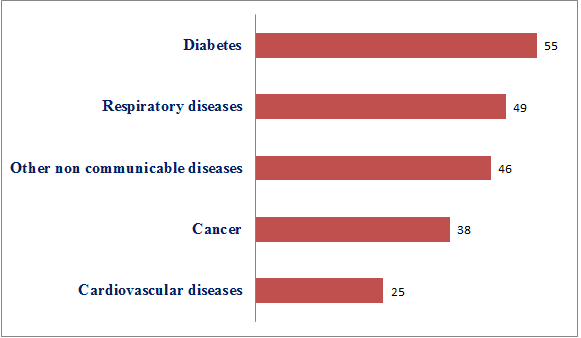Theme: Novel Therapeutics in Obesity & Prevention and Advancements in Chronic Diseases
Chronic Obesity 2020
ME Conferences extends its warm welcome to 3rd International Conference on Obesity and Chronic Diseases which is going to be held on July 15-16, 2020. Working under the theme "Novel Therapeutics in Obesity & Prevention and Advancements in Chronic Diseases” Chronic Obesity 2020 conference invites all the renowned scientists, Diabetologists, Endocrinologists, Surgeons, Paediatricians, Yoga and Natural Therapists, General Physicians, Primary Health Care Specialists, Epidemiologists, Pharmaceutical Industrial Delegates, Talented Young Scientists and Student communities from worldwide under a single roof where investigators across the globe can meet, network, perceive and present new scientific innovations.
Chronic Obesity 2020 is a worldwide stage to discuss the topics like Obesity and Cardiovascular Diseases, Chronic Respiratory Diseases, Depression & Mental Illness, Diabetology & Metabolic Diseases, Thyroid & Autoimmune Diseases, Obesity and Cancer, HIV/AIDS, Morbid Obesity & Chronic Obstructive and Pulmonary Disease (COPD), Obesity: Childhood, Teens, Adolescence, Pediatric Obesity, Obesity and Pregnancy: Risks Factors, Genetic Obesity, Obesity and Diet, Risk Factors Associated with Obesity, Liposuction and Advanced Weight Loss Treatments, Anti-Obesity Drugs and Weight-Loss Supplements, Ayurveda and Naturopathic Medicine, Yoga, Counselling and Physical Therapy, Digital Therapeutics of Chronic Diseases, Current Research on Obesity, Challenges and Prevention of Chronic Diseases. Upcoming Chronic Obesity 2020 gives the assessment of Obesity Symposiums 2020, Chronic & Metabolic Workshops 2020, Diabetes Treatment discussions and Cholesterol Metabolism Seminars
Target Audience:
- Metabolic & Bariatric Surgeons
- Basic Clinical Research Scientists & Students
- Registered Dieticians & Nutritionists
- Physicians
- Diabeticians
- Industry Professionals
- Health Promoters
- Pharmacists
- Medical Colleges
- Integrated Health Professionals
- Dieticians and Nutritionist
- BMI Training Institutes
- Diabetes Educators
- Physical Therapists
- Yoga & Fitness Professionals
- Obesity & Endocrinology Associations and Societies
- Business Entrepreneurs
- Public Health Professionals
Track 1: Obesity and Cardiovascular Diseases
Obesity is one of the major causes for cardiovascular diseases; Obesity is associated with an increased cardiovascular risk itself by atrial enlargement, ventricular enlargement. It leads to several structural and functional changes of the heart, which causes heart failure and the altered myocardial structure increases the risk of atrial fibrillation and sudden cardiac death. By the Mechanisms through which obesity increases CVD risk involves drastic changes in body composition that can affect haemodynamic functions too.
- Hypertension
- Coronary artery disease
- Atherosclerosis
- Dyslipidaemia
- Glucose intolerance
- Obstructive sleep apnea
- Thromboembolic disease
- Inflammation in cardiovascular disease.
Track 2: Chronic Respiratory Diseases
Obesity has been emerged as an important risk factor for the respiratory diseases due to adoption of sedentary lifestyles and increased pollution. In obese people, Fat tissue accumulation damages ventilatory function in adults and children. In other terms, Thoracic restriction associated with obesity is usually mild and is attributed to the mechanical effects of fat on the diaphragm and the chest wall resulting obstructive diaphragm excursion and reduced thoracic compliance.
- Chronic obstructive pulmonary disease (COPD)
- Asthma
- Obstructive sleep apnea
- Obesity hypoventilation syndrome.
Track 3: Depression and Mental Illness
Obesity and depression are interrelated, as the effect of one express on the other. obese People are tend to depressed due to the reasons which were leading to emotional ups and downs and many other health complications leading to psychiatric disorders and mental illness. Obese depression and mental illness consequences like psychosocial problems and suicidal thoughts are highly observed in young ones, as they face many stressful life events like bullying and weight based teasing. According to the Centres for Disease Control and Prevention (CDC) about 43% of adults with depression are obese.
- Emotional issues
- Sociological consequences
- Physical inactivity
- Sleep problems.
Track 4: Diabetes and Metabolic Diseases
It is a well-known fact that overweight (having a BMI of 30 or above) are at greater risk of developing metabolic chronic disorders like type 2 diabetes mellitus, insulin resistance. Accumulation of adipose tissue affects metabolism by secreting hormones, glycerol, and other substances including leptin, cytokines, adiponectin, and proinflammatory substances, and non-esterified fatty acids which are involved in the development of insulin resistance and disruption of fat metabolism. And the secretion of these substances will be increased leading to diabetes in obese individuals.
- Bariatric surgery
- Malabsorption
- Cardiovascular risk factors
Track 5: Thyroid and Auto Immune Diseases
Auto Immune diseases mainly related with decreased metabolic rate, decreased thermogenesis, and interrelate with a higher body mass index (BMI). As over weight is linked to many endocrine abnormalities including thyroid dysfunction .In obese people due to excess secretion of hormones, it influences the activity of thyroid hormones and coincides with dysfunctions of thyroid immunity and thyroid gland.
- Hypothyroidism
- Thyroid dysfunction and body weight
Track 6: Obesity and Cancer
Tumour cells are initiated and progressed in obese by combined effects of chronic low level inflammatory environment of adipose tissue causing DNA damaging, reduced DNA repair and the endocrine alterations leading to cancer, and Fat tissue produces excess amounts of oestrogen.
- Oesophageal adenocarcinoma
- Breast cancer
- Gastric cardio cancer
- Pancreatic cancer
- Ovarian cancer
- Colorectal cancer
- Kidney cancer
- Endometrial cancer
- Thyroid cancer
- Liver cancer
- Gallbladder cancer
Track 7: HIV/ AIDS
HIV-infected patients who underwent the antiretroviral therapy (CART) can live longer but comorbidities emerge earlier and more frequently. Among them metabolic and cardiovascular diseases are two leading causes of death for HIV-infected patients. As Overweight cause risk factors like reducing immunity through various auto immune disorders and chronic diseases in the general population that increasingly affect HIV-infected people. Hence obesity seems to have a detrimental effect on immune recovery after CART initiation.
- Serology
- Plasma viral load
- Heterosexual transmission
Track 8: Morbid Obesity and Chronic Obstructive Pulmonary Disease (COPD)
Moreover, obesity in patients with chronic obstructive pulmonary diseases were associated with several other health consequences like adipose tissue dysfunction, increased work of breathing the additive effects can make it a struggle to breathe and cause dyspnea -shortness of breath. Obesity also increases the risk of pulmonary disease, stroke, heart attack, and dementia and others like Transient nocturnal desaturation is due to decreased blood oxygen levels
- Pneumonia
- Influence of hypoxia
- Hypoventilation syndrome
- Night time breathing –sleep apnea
Track 9: Obesity: Child, Teens, Adolescence
Overweight and obese kids are the result of hereditary applications and other environmental factors. The child would going to remain hefty in adolescence and affected with further complications like diabetes, cardiovascular diseases and others by the pattern of Physiology and genetic history of child.
- Childhood obesity
- Early secondary growth ( Maturation)
- Comorbidities of Obesity in the Young
- Obesity and Gastrointestinal Disorders in Children
- Effects of Diabetes, Insulin Resistance & Oxidative Stress on young ones.
Track 10: Paediatric Obesity
It is the nutritional disorder among children and adolescents, according to the global report, around 20-24% children are under the cover of obesity and also the prevalence of obesity related risks like particularly obesity related–sleep disorders and non-alcoholic fatty liver disease are mostly visible in children in past few years, and type2 diabetes in paediatric patients.
- Binge eating disorder
- Homeostasis
- Pharmacotherapeutic interventions
- Endocrine disorders in children
Track 11: Obesity and Pregnancy: Risk Factors
Due to excess body mass there baby growth and function will be effected, The major risk factor for obese pregnant women is difficulty during vaginal delivery and also there is a risk of miscarriage, and a very high need of cesarean section and involves risk complications like C-section wounds and infections.
- Premature births
- Gestational diabetes
- High blood pressure
- Cardiac dysfunction
- Foetal macrosomia
- Metabolic syndrome
- Ultrasound defects.
Track 12: Genetic Obesity
Genetics contribute a one third part of obesity with the discovery of more than 50 genes that are strongly associated with it. The presence or absence of genetic factors tells susceptibility to obesity. In general, people who have obesity have multiple genes that susceptible them to gain excess weight. Such genes are the fat mass and obesity-associated genes (FTO gene), which are found in up to 50% of the population.
- Leptin deficiency
- Rare-single gene defects
- POMC deficiency
- More tendencies to store body fat.
Track 13: Obesity and Diet
In order to control obesity, a proper diet should be followed. Diet is the term which relates the caloric intake over particular time. A proper diet should be consists of balanced nutrition with fewer calories. Very low calorie diet - A very low calorie diet (VLCD) is a diet which involves consuming less than 3350 kilojoules (800 calories) per day and fewer intakes of food containing saturated fat, added sugars and alcohol.
- Atkins diet
- Ketogenic diet
- Vegetarian diet
- Vegan diet
- Raw food diet
- Plenty intake of water and dietary fibres
- Avoid fad diet
Track 14: Risk Factors Associated with Obesity
Obesity or overweight is obtained due to lack of physical inactivity, improper eating patterns, increased stress levels, not enough sleep. Over weight leads to several health complications like chronic diseases and others. The risk factors associated with obesity are of 2 kinds, some can be altered like unhealthy life style habits and environment. And others are like long-term unaltered such as family history, hereditary, race and ethnicity and sex.
- High blood glucose (diabetes)
- Cardiovascular diseases
- Chronic respiratory diseases
- High blood cholesterol and triglycerides
- Bone and joint complications
- Gallstones and liver problems
- Depression and mental illness
- Sexual problems
Track 15: Liposuction and Advanced Weight Loss Treatments
Liposuction is not an overall weight loss method or a treatment, just a kind of cosmetic surgery, which alters the body shape by breaking or sucking up the body fat which is undesirable. It is mainly worked on the abdomen, thighs, buttocks, neck, chin, upper and backs of the arms, and calves. The unwanted fat is removed through a hollow instrument, named as cannula, which is applied with powerful, high pressure vacuum and inserted under the skin.
- Power-assisted liposuction (PAS)
- Laser Assisted Lipolysis (LAL)
- Lymphedema
- Gynecomastia
- Lipo dystrophy syndrome
Track 16: Anti-Obesity Drugs and Weight-Loss Supplements
Overweight can be under control through weight loss supplements and drugs, the prescript weight loss medications along with a low calorie diet and the doctors approved exercise plan will give the best outcome and less side effects. It is noticed that 3%-9% of weight loss is assisted with the anti-obesity drugs.
- Diet pills
- FDA approved weight loss drugs
- Garcinia Cambogia Extract
- Raspberry ketones
- Caffeine
- Green coffee bean extract
Track 17: Ayurveda and Naturopathic Medicine
Ayurveda medications are the safe and holistic methods for management of overweight with no any side effects. In nature many herbs were helpful for burning fats. Naturopathy deals with the weight loss management by using the elements obtained from the nature for long term benefits.
- Medicinal herbs
- Ayurvedic weight loss capsules
- Low calorie satwik food
- Herbal powders
Track 18: Yoga, Counselling and Physical Therapy
Fitness programmes and diet should be planned regularly for controlling over weight, which are science based and associated with yoga-specific asana, cardio exercise, breathing exercise and meditation.
- Physical work outs
- Weight reduction therapeutic massages
- Steam and sauna
- vibrators
- General Psychology
- Antidepressant
- Healthcare and Mental Health
- Therapeutic Lifestyle Changes
- Reducing distress
Track 19: Digital Therapeutics of Chronic Diseases
Digital therapeutics are boon in 21 century, To create lifestyle behaviour changes by using software and remote monitoring tools with less medications. These programmes are incorporated by tracking sensors which gather patient health data along with their regular counselling delivered through smart mobile app and other smart devices as a self-report.
- e-Health
- Wearable gadgets
- Insulin pumps
- Blood glucose meters
Track 20: Current Research on Obesity
During past decades the growth curve of obesity is raising, even though one of the main global health objectives for the year 2020 is to reduce the prevalence of obesity among the population, but the situation is not satisfactory. Therefore there is more attentiveness is authorized on obesity management through,
- New innovations on emerging trends
- Advancement in behavioural and psychosocial observational research
- Clinical physiology
- Concentrating on diabetes and its complications
- Drug treatments and smart devices for obesity
Track 21: Challenges and Prevention of Chronic Diseases
A well-known scenario, Prevention is better than cure. Preventive measures are the primary health care options to avoid chronic diseases by obtaining healthy life style changes.
- Maintain a healthy weight
- Avoid tobacco use
- Regular physical activity
- Proper diet
- Regular clinical and physiological check ups
- Enough sleep
Importance and Scope:
The Main Objective of Obesity and Chronic Diseases Conference is to promote Awareness on the Chronic Health Complications caused by Obesity and to generate the knowledge on Prevention and Management for a Curative and Healthy Future.
Chronic Obesity 2020 Conference Aims to Assemble Globally Renowned Speakers, Bariatricians, Dieticians, Nutritionists , Endocrinologists, Bariatric Healthcare Professionals, Bariatric Surgeons, Cardiologists, Oncologists, Paediatricians, Pulmonologists, Obesity Medicine Clinicians, Professors, Social Workers, Health Care Administrations, Nurses, Researchers and Students from Different Regions Together and share their Valuable Ideas and Researches in the field of Chronic Obesity and Bariatrics.
Global Market Analysis of Chronic Obesity
Obesity greatly increases risk of chronic disease morbidity namely disability, cardiovascular disease, depression, type 2 diabetes, certain cancers and mortality. Childhood obesity results in the same conditions, with premature onset, or with prolong effect in adulthood. Therefore, the psychosocial and economic market costs of obesity alone, as well as when coupled with the chronic comorbidities are striking. The growth curve of middle class with accelerating urbanisation, people are tending to adopt more sedentary lifestyles. This is thrusting chronic obesity market rates and cases of diseases such as chronic diabetes upward.
According to the World Health Organization, It has been projected that, the worldwide prevalence of childhood overweight and obesity increased from 4.2% in 1990 to 6.7% in 2010. This trend is expected to reach 9.1% or 60 million in 2020 and chronic disease prevalence is expected to rise by 57% Chronic diseases will account for almost three-quarters of all deaths worldwide, and ischaemic heart diseases (IHD) accounts about 71% deaths, 75% of deaths due to stroke, and 70% of deaths due to diabetes will occur in developing Countries. Emerging markets will be hardest hit, as population growth is anticipated to be most significant in developing nations. Accelerating demand on healthcare systems due to chronic obesity has become a major concern.
Global Weight Loss Services Market Share
Regional Analysis
Europe is prominent region in the chronic disease management market. The increasing burden of chronic diseases in Europe is not only driven by growing geriatric population but the younger generations suffering from a wide range of chronic diseases along with over 80% of premature deaths due to non-communicable diseases like obesity by habituating to sedentary lifestyles and improper diet patterns and substituted junk foods.
According to the report, chronic obesity management market was valued approximately about USD 3.92 billion in 2018 and is assumed to a raise around USD 10.3 billion by 2024, at a CAGR of around 17.5% between 2019 and 2024.
Market Value Analysis by Emerging Countries
CAGR of 16.7% (2017-2026)
Annual Mortality by Prevalence of Chronic Illness
Chronic Obesity Associations and Societies: World Wide
- Global Obesity Prevention Centre
- The International Diabetes Federation
- The International Paediatric Association
- The International Union of Nutritional Sciences
- The International Development Research Centre
- CDC Division of Nutrition, Physical Activity, and Obesity
- NIH Obesity Research
- Boston Nutrition Obesity Research Centre (BNORC)
- Centre for Health and Health Care in Schools (CHHCS)
- NACCHO Obesity Prevention/Physical Activity/Nutrition
- National Collaborative on Childhood Obesity Research (NCCOR)
- The New York Obesity Nutrition Research Centre
- The Obesity Society
- European Association for the Study of Obesity (EASO)
- World Obesity Federation
- World Health Organization
- World Heart Federation
- The International Association for the Study of Obesity
- Rudd Centre for Food Policy & Obesity
- Texas Obesity Research Centre
- University of Minnesota Obesity Prevention Centre
- European Association for the Study of Obesity (EASO)
- CESS - Confederation Europeans Sport et Santé/ European Confederation Sport and Health
- CPME - Standing Committee of European Doctors
- EFAD - European Federation of the Associations of Dieticians
- EHFA - European Health and Fitness Association
- EPHA - European Public Health Alliance
- ESPGHAN – European Society of Paediatric Gastroenterology, Hepatology and Nutrition
- EUFIC - European Food Information Council
- Euro Health Net
- IBFAN - International Baby Food Action Network
- IDF Europe – The International Diabetes Federation – European Region
- IOTF - International Obesity Task Force
- The Association for the Study of Obesity
- WHO-Commission on Ending Childhood Obesity
- The worldwide association between television viewing and obesity in children and adolescents
- American Academy of Sleep Medicine
- American Society for Metabolic and Bariatric Surgery
- International Federation for the Surgery of Obesity
- Society of American Gastrointestinal and Endoscopic Surgeons
- The Obesity Action Coalition (OAC)
- SHAPE UP AMERICA!
- National Obesity Foundation (NOF)
- NIH-Weight-Control Information Network(WIN)
- American Society of Bariatric Physicians
- TOPS Club, Inc. (Take Off Pounds Sensibly)
- The Robert Wood Johnson Foundation Centre to Prevent Childhood Obesity
Major Universities Associated with Chronic Obesity Research Across the Globe:
- Harvard University
- Princeton University
- Swarthmore College of University
- Massachusetts Institute of Technology
- The College of William and Mary
- Williams College of University
- Amherst College of University
- University of Tokyo
- National University of Singapore
- University of Hong Kong
- Peking University
- Tsinghua University
- Seoul National University
- Nanyang Technological University
- The Australian National University
- The University of Sydney
- The University of New South Wales
- University of Auckland
- The University of Queensland
- Key Anti-Obesity Drug Manufacturing Companies
- Novartis Companies
- Instituto Llorente Companies
- Abbott Laboratories
- Servier Laboratories
- Marion Merrell Dow
- Otsuka Pharmaceutical
- Arena Pharmaceuticals
- F. Hoffmann-La Roche
- GlaxoSmithKline
- Orexigen Therapeutics
- Vivus University
- Amylin University
- Alizyme University
- Boehringer Ingelheim
- Eisai University
- Merck University
- Pharmaceutical Companies and Industries in Zurich
- Novartis (Sandoz)
- Hoffmann-La Roche
- Basilea Pharmaceuticals
- Actelion and Straumann
- Pfizer and followed by Merck & Co. and Sanofi
- Onyx Pharmaceuticals
- Harvard University, USA
- University of California, USA
- University of North Carolina, USA
- University of Helsinki, Finland
- Yale University, USA
- University of Texas, USA
- University of Pennsylvania, USA
- University of Pittsburgh, USA
- Osaka University, Japan
- University of Minnesota, USA
- Johns Hopkins University, USA
- Columbia University, USA
- University of Washington, USA
- Arizona State University, USA
- University of Johannesburg, South Africa
- Ain Shams University, Egypt
- North-West University, South Africa
- University of Cape Town, South Africa
- Stellenbosch University, South Africa
- University of the Witwatersrand, South Africa
- The American University in Cairo, Egypt
- University of KwaZulu-Natal, South Africa
- Rhodes University, South Africa
- University of Pretoria, South Africa
- Cairo University, Egypt
List of Related Societies:
Europe:
European Association for the Study of Obesity, Europe; International Union of Food Science & Technology, Europe; Association of European Cancer, Europe; European Childhood Obesity Group (ECOG), Europe; European society for Paediatric Endocrinology; Egyptian Association of Endocrinology; Diabetes and Atherosclerosis Endocrine Society; British Obesity Society, British Obesity And Metabolic Surgery Society; The Royal Society of Edinburgh; European Society of Endocrinology; Belgium International Confederation of Dietetic Association’s France; FAND Italian Association of Diabetics Central European Diabetes Association; International Diabetes Federation Italy; European Society of Cardiology; Romania European Society for Paediatric Research (ESPR), European Society for Therapeutic Radiation and Oncology; Austrian Nutrition Society, German Nutrition Society; Finnish Society for Nutrition Research; Yoga Federative Van de Nederlandstaligen in Belgie, Belgium; Institut Francais De Yoga, France; Irish Yoga Association, Ireland; Portuguese Yoga Federation, Portugal; Ukrainian Yoga Federation, Ukraine; Schweitzer Yogaverband, Switzerland
USA:
American Cancer Society ACS, USA; American Thoracic Society –COPD , America; Virginia association of naturopathic physicians (VAANP), USA; Canadian Digestive Health Foundation, USA; American society of clinical oncology, USA; Cardiology Society of Serbia, Spanish Society of Cardiology; Italian Association for the Defence of the Interests of Diabetics; National Research Council, USA; Canadian Nutrition Society, USA; American Society for Parenteral and Enteral Nutrition (A.S.P.E.N.), USA; American Yoga Association, America; Canadian Obesity Network, USA; Canadian Society for Exercise Physiology, USA; American Council of Science and health; American Society of Anaesthesiologists; Alberta Association of Naturopathic Doctors; Quebec Association of Naturopathic Medicine (QANM), Canada; American Obesity Treatment Association, USA; Canadian Diabetes Society, Canada; AOASO - Asia Oceania Association for the Study of Obesity, India; The Obesity and Metabolic Surgery Society of Singapore (OMSSS), Singapore;
Asia-pacific:
The Nutrition Society of Australia, Asia; Academy for Eating Disorders; The Korean Nutrition Society, Asia; Dieticians Society of Asia; Nutrition Society of Malaysia, Asia; The Endocrine Society of Australia; Malaysian Association for the Study of Obesity; Diabetes Indian Association, India; Australian Register of Naturopaths and Herbalists (ARONAH), Australia; Philippine Society of Endocrinology and Metabolism, Philippine; Turkey Society of Endocrinology and Metabolism, Turkey; Asia-Pacific Clinical Nutrition Society; Korean Obesity Society, Korea; Japan Society for the Study of Obesity, Japan; The Obesity Surgery Society of Australia and New Zealand, Australia; ASEAN Federation of Endocrine Societies; Asian Association of Endocrine Surgeons; Australasian Paediatric Endocrine Group; South Asian Federation of Endocrine Societies; Asia Pacific Paediatric Endocrine Society; Endocrine Society of the Republic of China, Vietnam Association of Diabetes & Endocrinology, Endocrine Society of Thailand; Indonesian Society for Endocrinology, Hong Kong Society of Endocrinology; Metabolism and Reproduction, Endocrine and Metabolic Society of Singapore; Malaysian Endocrine and Metabolic Society; Pakistan Endocrine Society; Syrian Society of Endocrinology
Middle East:
Obesity and Metabolic Surgery Society, Annual Gulf Obesity Surgery Society, The Nutrition Society, Paediatric Endocrine Society, Metabolic and Endocrine Society; Iran endocrine society; Israel society for Paediatric Endocrinology; Israel society of Research; Egyptian Association of Endocrinology; Egyptian Society of Endocrinology and Obesity; Arabic Association for the Study of Diabetes and Metabolism; Chronic Care Centre; Dubai Diabetes Centre; Dubai Health Authority ; Gabric Diabetes Education Association, National Diabetes Organization, Qatar Diabetes Association; The Endocrine Society of India; German Endocrine society; The European society of Endocrinology; International society of Endocrinology; Spanish society of Endocrinology; Pan Arab Society of Metabolic and Bariatric Surgery (PASMBS)
Related Conferences:
- 3rd Middle East Obesity, Bariatric Surgery and Endocrinology Congress April 27-28, 2020 Dubai, UAE
- 28th International Diabetes and Healthcare Conference, July 15-16, 2020 Helsinki, Finland
- 13th International Conference on Childhood Obesity and Nutrition March 16-17, 2020 London, UK
- 3rd International Conference on Obesity and Diet Imbalance October 22-23, 2020 Helsinki, Finland
- Annual Congress on Diabetes, Metabolism and Obesity July 06-07, 2020 Sydney, Australia
- The 3rd Congress of The Jordanian Society for Obesity Surgery 2020, 02 October-03 October 2020 Amman, Jordan
- Treating Obesity 2020: The Blackburn Course in Obesity Medicine, 04 June 2020-06 June 2020, Boston, MA, United States
- 13th International Conference on Advanced Technologies & Treatments for Diabetes 2020, 19 February 2020-22 February 2020, Madrid, Spain
- CCI Live — Complex Cardiovascular Intervention (CCI) Live, 09 June 2020-10 June 2020, Newcastle upon Tyne, United Kingdom
- 2nd International Conference and Exhibition on Paediatrics & Neonatology, 16 July 2020 - 17 July 2020, Cracow, Poland
Conference Highlights
- Obesity and Cardiovascular Diseases
- Chronic Respiratory Diseases
- Depression & Mental Illness
- Obesity: Childhood, Teens and Adolescents
- Obesity and Pregnancy: Risks factors
- Genetic Obesity
- Obesity and Diet
- Diabetology & Metabolic Diseases
- Risk Factors Associated with Obesity
- Liposuction and Advanced Weight Loss Treatments
- Anti-obesity Drugs and Weight-loss Supplements
- Thyroid & Autoimmune Diseases
- Obesity and Cancer
- HIV/AIDS
- Morbid Obesity & Chronic Obstructive and Pulmonary Disease (COPD)
- Pediatric Obesity
- Ayurveda and Naturopathic Medicine
- Yoga, Counseling and Physical Therapy
- Digital Therapeutics of Chronic Diseases
- Current Research on Obesity
- Challenges and Prevention of Chronic Diseases
To share your views and research, please click here to register for the Conference.
To Collaborate Scientific Professionals around the World
| Conference Date | July 15-16, 2020 | ||
| Sponsors & Exhibitors |
|
||
| Speaker Opportunity Closed | |||
| Poster Opportunity Closed | Click Here to View | ||
Useful Links
Special Issues
All accepted abstracts will be published in respective Our International Journals.
- Journal of Obesity & Weight Loss Therapy
- Endocrinology & Metabolic Syndrome
- Journal of Nutritional Disorders & Therapy
Abstracts will be provided with Digital Object Identifier by
















